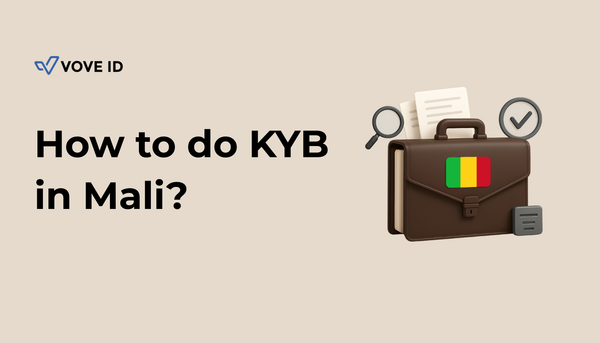AML Compliance in Uganda: A 2025 Guide for Fintechs and Regulated Businesses
Explore Uganda’s 2025 AML framework, FATF compliance, and how VOVE ID streamlines fintech compliance with digital onboarding, KYC/KYB verification, and AML screening for Uganda’s evolving financial landscape.

Introduction
Uganda has made significant strides in strengthening its Anti-Money Laundering (AML) and Countering the Financing of Terrorism (CFT) frameworks. In February 2024, Uganda was removed from the Financial Action Task Force (FATF) grey list, reflecting enhanced supervision, inter-agency collaboration, and regulatory reforms. Fintech transactions grew by 22% in 2024 (Bank of Uganda), driving demand for robust AML solutions.
For fintechs and regulated businesses, this shift offers opportunities but demands compliance with modern, risk-based frameworks to meet Financial Intelligence Authority (FIA) standards. RegTech platforms like VOVE ID are enabling seamless AML compliance through automated KYC, KYB, and AML screening, helping businesses build trust and align with regulations.
Uganda’s AML Regulatory Framework
Uganda’s AML framework is anchored in the Anti-Money Laundering Act, 2013 (Cap. 118), supported by the Anti-Terrorism Act and sector-specific regulations. The framework aligns with international standards set by FATF and the Eastern and Southern Africa Anti-Money Laundering Group (ESAAMLG), emphasizing transparency, beneficial ownership, and financial integrity.
Key Regulators:
- Financial Intelligence Authority (FIA): Oversees AML/CFT supervision, intelligence analysis, and law enforcement coordination (FIA Uganda).
- Bank of Uganda (BoU): Supervises banking and financial sectors, enforcing risk-based compliance (Bank of Uganda).
- Capital Markets Authority (CMA): Regulates securities and investment firms.
- Uganda Microfinance Regulatory Authority (UMRA): Oversees non-bank financial institutions.
- Uganda Registration Services Bureau (URSB): Manages business registration compliance.
Core AML Obligations for Regulated Businesses
Under the AML Act, “accountable persons” (banks, fintechs, microfinance institutions, forex bureaus, and Designated Non-Financial Businesses and Professions — DNFBPs) must implement measures to prevent money laundering and terrorist financing. Key obligations include:
- Customer Due Diligence (CDD): Verify customer identities and beneficial ownership using reliable, independent data. Enhanced due diligence applies to high-risk customers and politically exposed persons (PEPs).
- Record Keeping: Maintain identification and transaction records for at least 10 years.
- Suspicious Transaction Reporting (STR): Promptly report suspicious activities to the FIA via established channels.
- Risk-Based Approach (RBA): Design internal controls based on exposure level, customer profiles, and transaction patterns.
- Internal Training and Monitoring: Conduct regular staff training and internal audits to ensure compliance.
| Obligation | Description | Regulator |
|---|---|---|
| CDD | Verify identities, beneficial ownership | FIA, BoU |
| STR | Report suspicious transactions | FIA |
| RBA | Risk-based internal controls | BoU, CMA |
| Record Keeping | Retain records for 10 years | FIA, UMRA |
| Training | Regular staff training and audits | FIA, URSB |
Recent Progress and Reforms
Uganda’s exit from the FATF grey list in February 2024 was driven by robust reforms:
- Amendments to AML Act: Aligned with FATF recommendations, including January 2025 exclusion of NGOs and churches from “accountable persons” to reduce compliance burdens (AML Act Schedule 2).
- National Risk Assessment (NRA): Updated in 2024 to identify emerging risks, such as virtual asset transactions.
- Inter-Agency Cooperation: Strengthened collaboration between FIA, BoU, law enforcement, and regulators.
- Regulatory Impact Assessments (RIA): Evaluated AML measures’ effectiveness.
- Risk-Based Supervision: Adopted by FIA across financial and non-financial sectors, with July 2025 proposals addressing FATF’s 11 remaining recommendations.
These reforms have enhanced Uganda’s reputation for transparency, boosting investor confidence in fintech and digital finance.
Challenges That Remain
Despite progress, challenges persist:
- Limited Capacity: Smaller institutions face understaffing (e.g., FIA’s <50 AML inspectors for 2000+ entities, IMF 2025).
- Automation Gaps: Manual transaction monitoring in forex bureaus and remittance firms.
- Inconsistent Compliance: Uneven practices among DNFBPs and virtual asset providers.
- Training Needs: Ongoing demand for staff training and better data-sharing mechanisms.
To sustain FATF compliance, regulators and businesses must invest in technology and data-driven supervision.
How VOVE ID Supports AML Compliance in Uganda
As digital finance grows across East Africa, RegTech platforms like VOVE ID simplify compliance. VOVE ID offers a secure, API-driven platform that supports:
- Digital Onboarding: Biometric identity verification for seamless customer onboarding.
- KYC and KYB Checks: Verification against national databases and global watchlists.
- AML Screening: Helps businesses identify and manage potential high-risk customers or entities during onboarding and ongoing monitoring.
Regulatory Compliance Support: Facilitates efficient record-keeping and reporting processes in line with FIA and AML regulations.
By combining local expertise with advanced technology, VOVE ID helps Ugandan fintechs and regulated businesses reduce onboarding friction and align with FIA guidelines.
Uganda’s national ID system, locally known as Ndaga Muntu, covers over 25 million registered IDs (NIRA, 2024), enabling faster electronic KYC (eKYC) verification for customer onboarding and AML risk management.
Conclusion
Uganda’s AML landscape in 2025 reflects a country poised for sustainable digital growth, underpinned by robust institutions and global regulatory alignment. For fintechs and regulated businesses, a strong compliance culture is a growth enabler.
By partnering with VOVE ID, institutions can meet Uganda’s AML and CFT requirements through secure, automated identity verification and screening. Explore how RegTech can streamline your compliance journey in Uganda’s evolving financial landscape: compliance powers innovation.
Strengthen your AML compliance with a trusted digital identity partner.
Explore how VOVE ID can help your business streamline onboarding, enhance due diligence, and stay compliant with Uganda’s evolving AML regulations.




